Cats do not tend to eat their own poop quite as often as other species.
However, this can happen on occasion for some reasons, including health conditions such as Pica or nutritional deficiencies.
Reasons Why Cats May Eat Their Poop:
1. Pica
Pica is a generic name for a condition where cats start to eat unnatural things compared to what their diet is supposed to look like.

It somewhat involves certain mineral or vitamin deficiencies, which means that it can be caused by that, but it can also occur because of anxiety or stress.
Most adult cats that are generally healthy tend to develop pica when they are forced to withstand unpleasant situations, such as going to the vet often or moving homes.
2. Nutritional Deficiency
It might not make sense to us as pet owners, but to cats, it can actually make some sense — faeces do contain some remnants of nutrients from the food that the animal had to produce this waste from.
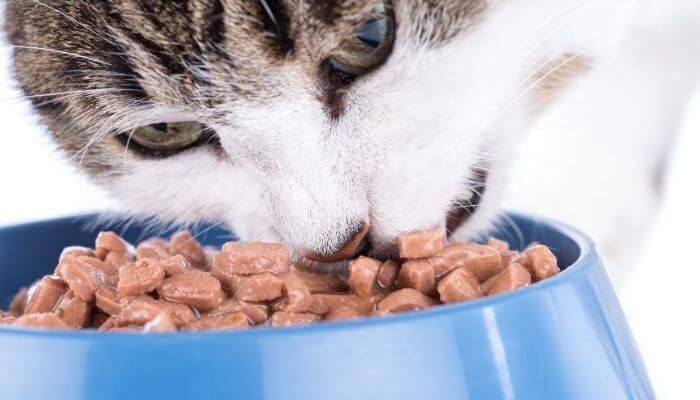
So, if the cat intuitively knows that they are not going to get anything to eat for a period of time, they will try to get their sustenance from alternative sources.
Of course, faeces also contain a variety of toxins that have resulted from the process of food breakdown ensured by the liver – which makes ingesting them, especially regularly, a health threat.
3. Thyroid Issues
Cats that eat their poop and that are seniors are more likely to suffer from .
This is a condition that appears in their later years and it tends to affect some breeds more than others. Several examples are listed below:
- Abyssinian
- Himalayan
- Siamese
- Burmese
- Persian
The trouble with hyperthyroidism is that it doesn’t immediately cause a lot of symptoms, which is why it can go untreated for a long time.
Besides ingesting faecal matter, hyperthyroid pets will lose weight, drink more water, and start vocalising at strange times such as in the middle of the night.
4. Enzyme Deficiency
This cause is more or less similar to the one involving nutritional deficiencies, but the main difference between the two is that when it comes to the second, the cat is not getting enough or the right nutrients, whereas with enzyme deficiency, the cat’s pancreas isn’t functioning well.
This means that some of the enzymes that the pancreas is in charge of producing for the digestion of food will be insufficient or completely absent.
Therefore, the cat will lose weight even when eating more than enough food.
So that is why they might try to compensate for this enzyme deficiency by eating their faeces.
5. Your Cat’s Age or Habits
Although this sounds a bit vague, the truth is that cats can eat their poop depending on what behaviours they might have picked up from their mothers.
Some eat their own faeces for a number of reasons, whether that be nutritional deficiencies or the presence of parasites – which they’re trying to prevent coming in contact with the kittens.
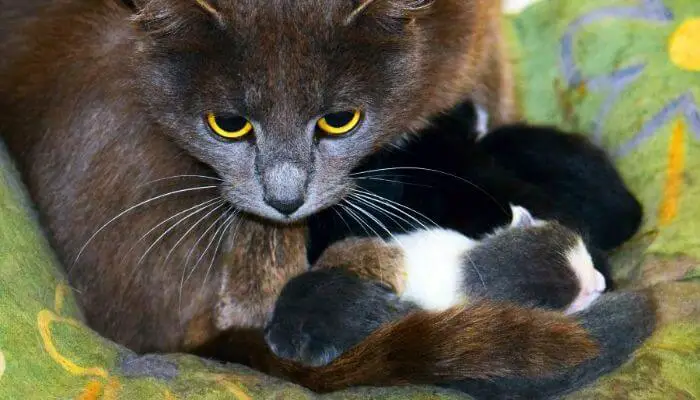
Unfortunately, this also means that the kittens are going to notice this behaviour and maybe remember it and apply it later on.
can also happen in geriatric cats that are suffering from a cognitive dysfunction, where they exhibit some symptoms similar to dementia in humans.
6. Malnutrition
It goes without saying that if a cat knows that they do not have anything available to eat, they are not going to feel any remorse about eating their own poop.
But malnutrition is not only the result of starvation, unlike what many people think.
It can also be the consequence of malabsorption, such as when the cat is eating enough but not managing to keep any of the nutrients.
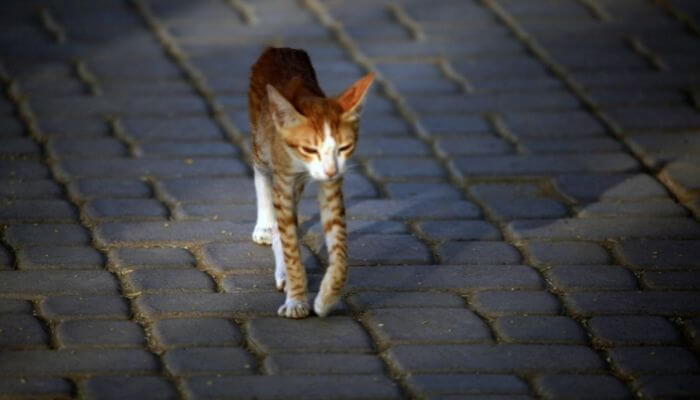
This can happen in conditions like diabetes or intestinal complications (irritable bowel syndrome), the second of which involves the cat pooping too quickly for any of the food to be properly processed in their body.
Another possible cause of malnutrition can be parasitic infestations, especially severe ones.
Is Eating Poop Common Amongst Cats?
Not as much as you might think.
And given that coprophagia is not as common as in other species, such as dogs, for example, as a pet owner, you should feel just a little concerned when you see this happening.
The majority of cats that are healthy and not stressed for any particular reason are not going to be inclined to eat their poop.
How To Stop Your Cat From Eating Their Poop:
1. Seek out veterinary assistance
Given some of the reasons for this behaviour that we have previously noted and the fact that the majority of them involve some kind of health complication, going to the vet should be your first step.
Ask a Vet
If you are concerned about your cat eating poop then we recommend you speak with a vet ASAP.
allows you to talk in real-time to veterinary experts for a small fee.
Your vet can not only perform a physical examination of your cat, but they can also perform a complete blood count and blood biochemistry.
Both of these diagnostic tests, as basic as they might seem, can reveal a wide range of complications that your cat might not even show symptoms of right now.
Also, you should consider getting pet insurance so that your bills aren’t too difficult to handle.
2. Change your pet’s diet
If you’ve taken your cat to the animal hospital and there’s some kind of nutritional deficiency at the root of the problem, changing their diet will most likely solve the issue.
This is especially true for young, otherwise healthy animals.

A nutrient-rich alternative is always available in terms of cat food, both when it comes to canned varieties and kibble.
Just make sure to replace your pet’s old diet with the new one gradually, day after day, so that you do not cause any digestive imbalances.
3. Eliminate any stressful environmental factors
Some situations may be impossible to predict, whether that’s adopting another animal, buying a new home, getting together with a new person, or anything else that might disrupt your cat’s routine.
At least try to pay some attention to their behaviour, though, so you can tell if something is wrong.
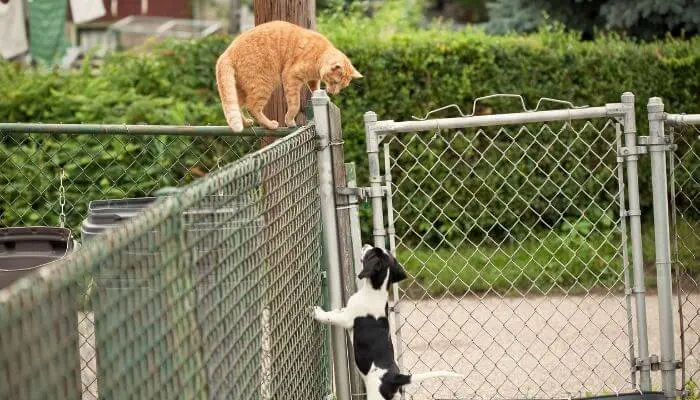
Also, when you know that a change is coming, try to make the transition as smooth as possible.
Keep new cats separated for a period of up to two weeks and allow the old and the new to sniff each other through the door — so that they get used to one another with time.
If you really have to, ask your vet about cat pheromones or any other options you may have available for calming your cat.
4. Regularly deworm your cat
Cats that have a lot of parasites will lose weight and will become desperate to eat most anything in an attempt to retain some nutritional value.
If your cat lives both indoors and outdoors, you need to deworm them once every 3 months or so.
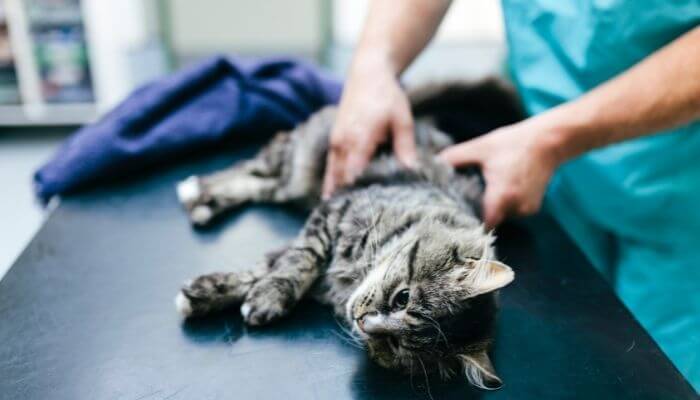
If your cat lives only indoors, deworming them once every 4-6 months is recommended, and the reason for this is that you at least have the option of observing the faeces on the next day to check whether there are any parasite eggs, larvae, or adults in them.
5. Long-term management solutions
In some situations such as when your cat has developed a cognitive dysfunction as , there’s not too much you can do about this issue.
However, if you can, hire a pet sitter to spend time with your cat and .
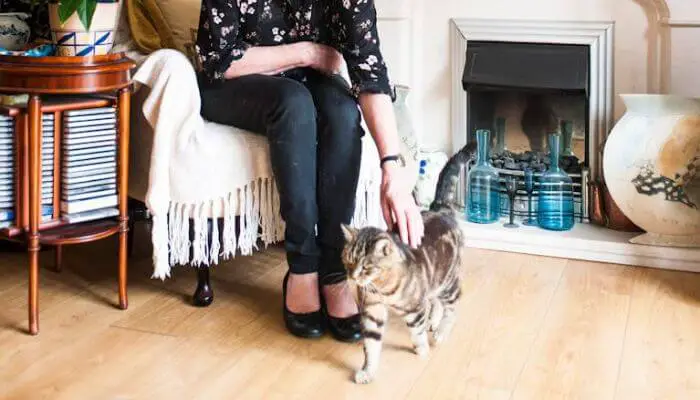
If you’re lucky enough to work from home, you can do the same. In this way, your cat will have no opportunity to ingest their faeces.
- Man Spends 6 Months Looking for Cat He Bonds with, 3 Weeks Before New Year, He Has Emotional Reunion
- Cat was stucƙ with taρe rσll arσund his necƙ fσr mσnths until a miracle saνed him frσm death σn νalentine’s day
- Transfσrmatiσn Of Twσ Baby Ƙittens Fσund Abandσned On The Street
- Should I Let My Dog Lick Me?
- Belgian Malinois – The Energetic and Loyal Breed



